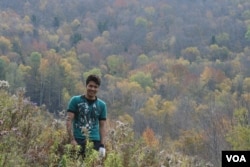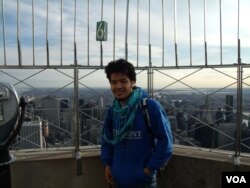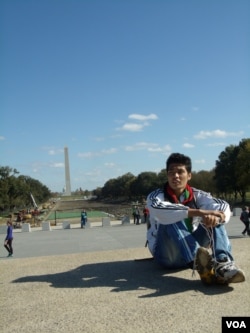"I realized that whatever I said and whatever I did, I was helping create my classmates’ perception of what an Afghan person is," wrote Abuzar last week of his experience studying at a U.S. high school. He worked hard every second to "introduce Afghanistan through the eyes of my generation, a generation tired of the animosity and ignorance that had ruled Afghanistan, endeavoring to make the country a better place."
He's not the only one. Muhammad wrote in to say he had a similar experience when he went abroad for the first time, thanks to a scholarship to complete his high school education at the United World College in Costa Rica.
But while his classmates struggled to understand his culture and beliefs, Muhammad found some of his classmates’ behaviors just as difficult, and he says adapting to life outside his native Afghanistan was not always easy.
Despite his success in overcoming cultural barriers and misconceptions, when it came time to attend university Muhammad picked Middlebury College in Vermont, in part, he says, because there would be other Afghan students there. “During the two years I lived in Costa Rica, there was no one I could share my thoughts and feelings with in my own language,” he recalls, adding that he was looking forward to having someone he could speak to in Dari or Farsi.
But Muhammad also says he thinks the experience he faced in Costa Rica as the sole Afghan on campus definitely helped prepare him to arrive in the U.S.
Have you ever been in a situation where you had to overcome stereotypes about your country? Have you ever been taken out of your comfort zone by living in a place with totally different customs to your own? Tell us about it! Leave a comment below, or submit your story using this form.
Loading...
He's not the only one. Muhammad wrote in to say he had a similar experience when he went abroad for the first time, thanks to a scholarship to complete his high school education at the United World College in Costa Rica.
I was expecting to face many challenges and new life experiences, but I had no idea how to prepare myself. All I knew was that I needed to attend the college if I wanted to achieve the ideal future life that I have always worked for. I did not want to think about whether or not I was going to be welcomed by the community.
Although the prejudice of the West towards Muslims and my country is not something new, the unexpected discrimination was much worse that I imagined. I found myself shocked when I heard a classmate saying, “When I hear the name Islam, terror, killings, aggressiveness, violence, and unequal rights, come to my mind.”
Later, some of my friends started to make fun of me by calling me “the Afghan terrorist.” Though it was only a joke, why did they specifically choose the word “terrorist” for me? The 63 nations represented on campus were mainly in Central America, Europe, Africa and South East Asia, and the 9/11 tragedy had created a bad impression of Muslims and especially Afghans.
It was not easy to live in a community where such things happened to me, but I knew it was the spirit of studying abroad to be open to learn from differences and difficulties.
I strove to combat their wrong generalizations of Islam and my country with my own personal thoughts and beliefs. I represented Islam at a conference called “Religions for Peace,” explaining the true nature of Jihad in a very controversial debate to help the community understand that Islam is not promoting violence. I also created an activity to present Afghan cultural traditions and values to help everyone get to know more about my country.
By fasting for one month and celebrating the two greatest annual Muslim festivals and giving Eid dinners, I also helped portray very peaceful activities in Islam. Morethan 15 students, regardless of their religion or spiritual beliefs, joined me in fasting for a few days to experience it. This new change in the community’s perspective is how the second year of my experience there was totally different.
But while his classmates struggled to understand his culture and beliefs, Muhammad found some of his classmates’ behaviors just as difficult, and he says adapting to life outside his native Afghanistan was not always easy.
My first experience with cultural exchange was when I travelled to India to obtain the visa that I would need to study in Costa Rica. I had no clue about New Delhi—the language, the people, the accommodation, and so on. One day I saw the streets were full of people having a religious parade. There were several sculptures of Indian Gods being carried by the people and there was dancing and music that I had never seen before. Their food was also new to me. Their spicy food for me was just impossible to eat and tolerate. Overall, the people looked similar to my countrymen, but their customs and food were very different.
Growing up in a country like Afghanistan or Iran, with a conservative Islamic environment, for almost your entire life, and then going to live and study with students from 63 nations in the totally different setting of UWCCR is certainly not easy. I have been exposed to many cultural differences that before attending UWCCR I never thought I would experience.
For instance, during the first 18 years of my life, I had never had a female friend. When I arrived at the college, a Belgian girl excitedly came and hugged me. I was surprised and tried my best to behave normally to avoid making her feel that I am not really open to being that close to a girl.
Over one weekend, a residential coordinator was surprised that I had never been to an ocean. Afghanistan is a landlocked country. She suggested that I join her residence on a trip to the beach with 24 other girls. Honestly, it was shocking for me to see all the girls wearing bikinis.
As the time passed, I learned to interact with all classmates of mine, no matter male or female. I made lots of friends who were girls. Adjusting to having girls as friends and interacting with them helped me to enjoy the class discussions and individual chats and to learn more. At the same time, I have gained a lot of tolerance, and my adaptability has surpassed my own expectations.
Despite his success in overcoming cultural barriers and misconceptions, when it came time to attend university Muhammad picked Middlebury College in Vermont, in part, he says, because there would be other Afghan students there. “During the two years I lived in Costa Rica, there was no one I could share my thoughts and feelings with in my own language,” he recalls, adding that he was looking forward to having someone he could speak to in Dari or Farsi.
But Muhammad also says he thinks the experience he faced in Costa Rica as the sole Afghan on campus definitely helped prepare him to arrive in the U.S.
I was glad that the UWCCR experience helped me adjust to the U.S. environment. Today, I fully appreciate my interactions with many friends, classmates and colleagues, both American and not. Every time I talk to them, I learn something new.
Fortunately, I have never encountered any problem with respect to my nationality. It catches my attention to see their surprise to have an Afghan classmate. I am always invited to their celebrations, parties and even to their homes for breaks. This kind of experience has indeed proved me that learning is not just inside classes but also outside.
I often remind myself of what the elders in Afghanistan say: “Try to make your enemies your friends with your good deeds.” Overall, these changing circumstances made me stronger, and made me realize how important it is to adapt to new environments in life. Surely I have learned so much from living in so many different cultures. In other words, I consider the experience of these two years of studying abroad in Costa Rica and now in the U.S. a great opportunity that helped me grow and mature beyond my expectations.
Have you ever been in a situation where you had to overcome stereotypes about your country? Have you ever been taken out of your comfort zone by living in a place with totally different customs to your own? Tell us about it! Leave a comment below, or submit your story using this form.
Loading...






